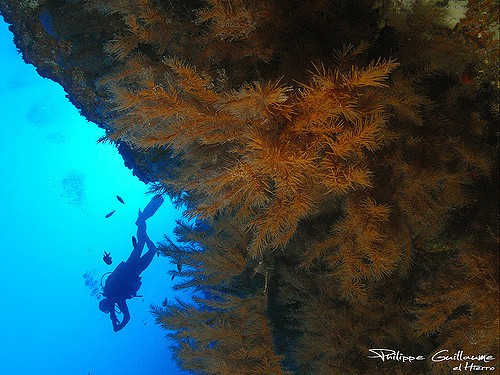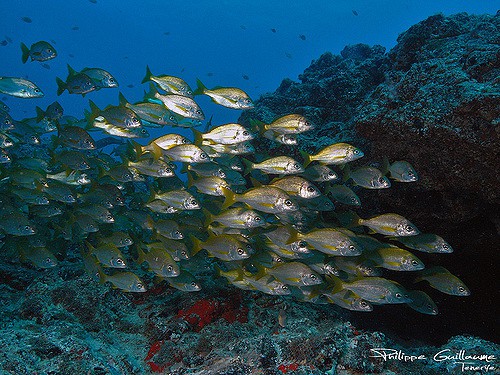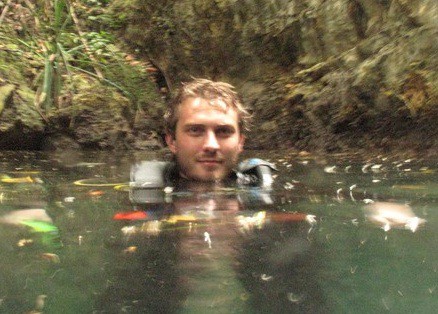
If you have dived in Spain before, please share your experiences: Dive spots you would recommend, which Dive Center you used, Fishes & Diving, Visibility, Currents, etc. Please post your comments in the section below, by doing so you will help fellow divers to plan their next trip


Spain is one of the leading vacation destinations in Europe. Europeans flock here to the coast and islands to escape the harsh winters of the north or to get an early jump on summer in the spring.
Furthermore, Spain has excellent scuba diving, but it is underrated as a dive destination. Indeed, the reason is mostly that the country is so popular that scuba diving becomes just one more point on a long “to do list“! Two of the biggest advantages of diving in Spain is that destinations are easily reached and that in some places the diving season is year round!
In this page you will find more detailed information about scuba diving in Spain.
Table of contents
Best Dive Review
Spain offers both warm water and cold water diving. Indeed, scuba divers will find many dive sites of each kind to choose from. Plus, many marine reserves are along the coast, each a worthy dive destination.
Listing a few great dive sites would not do justice to the other dive sites that would not be listed. Instead, we will list some of the best dive destinations within Spain:
- Barcelona is better known for its football team than for scuba diving, that’s for sure! However, it does have some excellent diving. In fact, when it comes to scuba diving, Barcelona is overshadowed by their nearby neighbor: the Costa Brava. Indeed, the Costa Brava is 160 kilometers of Mediterranean coastline which boast outstanding diving. Barcelona is the best way to reach Costa Brava!
- The Bay of Biscay is on the northwest coast of Spain and is shared with France. This is cold water diving and conditions can be rough in places. Diving is best in July and August while sea conditions can be dangerous during winter. However, for experienced divers which are used to these conditions, the diving is excellent! Also, there are coves within the bay that are suitable for less experienced divers. The Crusoe Treasure winery ages its wine sunken in the bay. The vineyard allows 20 divers a year to visit their underwater cellar.
- The Balearic Islands are located off the coast in the Mediterranean Sea and offer outstanding diving. The four main islands have a reputation as excellent vacation destinations. Here divers will find mostly calm warm waters with a plentiful marine life.
- Costa del Sol, which center point is the city of Malaga is located on the southeast coast of Spain. Indeed, Costa del Sol is a 200 kilometer stretch of coastline with warm water and year-round diving conditions.
- The Canary Islands are located off the coast of Africa in the Atlantic Ocean. The islands are volcanic in nature, which influence the underwater landscape. Indeed, scuba divers will experience remarkable dive sites with huge boulders, caverns, swim thrus, caves and massive marine life. Many consider the Canary Islands the best diving in the open Atlantic Ocean.
How to dive Spain?
The diving in Spain is land-based. Indeed, there are no major liveaboards since dive sites are close to shore and no long boat rides are needed. There are few dive resorts, most diving is done from standalone dive centers.
Best time to dive in Spain
Every dive destinations in Spain have their own “best time for diving”. Let’s see what are the best months to dive in Spain!
- Costa Brava is best from late May to early September. Many of the dive centers close down outside of this time, but diving is still available with thick wetsuits or dry suits.
- Costa del Sol is a year-round dive destination without a need for a dry suit in the winter. The best diving is from April to October.
- The Bay of Biscay is best in July and August. Outside of these times, divers will likely need dry suits and be experienced on most dive sites.

The Canary Islands by Philippe Guillaume
- The Canary Islands is another year-round diving destination. The best time is often quoted as to be from September to February. However, it is also an excellent springtime destination. Most divers find that in the summer a 5 mm wetsuit is best and in winter a 7 mm wetsuit.
Top liveaboards in Spain according to divers reviews
Dive courses
Costa del Sol and the Balearic Islands are great places to learn how to dive. The Canary Islands also have sites that are suitable for Open Water Diver Training. Since many sites have great visibility and warm waters, photography courses are also very popular.
Scuba Diving conditions
The diving conditions vary by the destination and the time of the year. Some of this has been discussed in the best time to dive section.
First, the Barcelona/Costa Brava area, Costa del Sol, and the Balearic Islands are all known for good visibility and warm water diving. In these areas, we will see visibility that averages 30 meters and water temperatures of up to 24°C/75°F in the summer. Costa del Sol will see water temperatures around 15C/59F in February. Also, the marine currents in these areas are mild, if there are any.
The Canary Islands is slightly cooler in summer around 23°C/73°F and is still 17-18°C/63-64°F in winter.
Snorkelling in Spain
Most of the dive destinations in Spain have sites that are great for snorkeling. In fact, the Costa del Sol and the Balearic Islands will have the greatest opportunities.
Fishes and Coral
There are eight species of whales and dolphins that reside in the Mediterranean Sea. The species include the bottlenose dolphin, the common dolphin, sperm whale, and orca. Another 12 species are found seasonally. Also, there are 47 different species of sharks and hundreds of species of fish, with many of them being invaders from the Red Sea.

Scuba Diving Tenerife Canary Islands photo by Philippe Guillaume
Diving Safety
If you are planning an upcoming dive trip or travelling to Spain, it is a really good idea to invest in travel insurance for scuba diving, because you never know what could happen and when you might need it (because accidents do happen!). I recommend this diving insurance as they offer worldwide coverage and focus on providing scuba divers a quality insurance and medical assistance service.
Spain is often overlooked as a diving destination. However, for divers, especially those in Europe, it really deserves another look. It is less expensive for the European diver to travel and dive in Spain than to the Red Sea. Depending on where you are from, long weekends are ideal for diving Spain.
Photos Spain
Travel Guide
Now that you know all about the underwater world, you might want to start planning your scuba holiday! Check out our Spain Travel Review for information about how to get there, activities and excursions, where to stay, and more.

 Destinations
Destinations









Aquí tienes todo el texto corregido y traducido al inglés:
“I have certifications in Open Water Diver and Advanced Diver. I have dived in South America and the Pacific Ocean, with water temperatures of 31°C. I have specializations in marine wildlife recovery, underwater photography, fish identification, and shark rehabilitation. At the moment, I don’t have diving equipment, but I am interested in learning more and working with you and your team.”
In Tenerife one of the most iconic dives is “El Peñón Wreck”, this wreck was sunken on 2006 and is 15 degrees inclinated, so the front side is at 18 metres and the back side is at 32 metres.
It can be dived by certified diver of all levels.
We have our dive center in front of Tabaiba´s Wreck “El Peñón”, and we welcome you to visit us Tenerife.